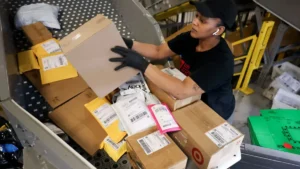The healthcare industry is reliant on the safe, fast, and dependable delivery of sensitive items, including lab specimens, pharmaceutical products, medical records, and equipment. Hospitals, laboratories, and clinics need transportation partners that can assure that these items will arrive safely and on time. This is where medical couriers come in.
When launching a courier business, medical courier contracts can provide revenue that is consistent, predictable, and stable to foster business growth in the long term. However, obtaining medical courier contracts requires more than a vehicle and some spare time. You need compliance, the ability to earn trust, industry knowledge, and the ability to demonstrate professionalism.
This guide will assist you in your pursuit of securing medical courier contracts in beginning with developing a solid foundation, and then progressing to engaging in healthcare facilities with confidence.
Understand the Medical Courier Industry
It is necessary to consider the demands of this industry before you pursue contracts:
- Time sensitivity: Specimens and medications need to be handled very precisely to ensure they are accurate and safe.
- Compliance: Couriers must comply with HIPAA in the U.S. (or local equivalent privacy policies) to protect patient data.
- Safety protocols: When handling blood samples, vaccines, or medical supplies, specific handling knowledge and packaging are required.
Unlike standard delivery, a medical courier contract places responsibility on you to protect both the patient and the healthcare provider’s reputation.
Meet the Basic Requirements
To apply for a contract medical courier position, you’ll need to have:
- Proper licensing: You need to have a valid driver’s license and you need to be registered as a business..
- Reliable vehicle: If you’re encountering the delivery of temperature-sensitive items, your transportation will need to be clean, well-maintained, and sometimes refrigerated.
- Insurance: You need to acquire liability and cargo insurance to cover accidents or loss.
- Background checks: Most hospitals require couriers to pass a criminal background check and drug screening process.
These requirements show healthcare providers that you’re serious, trustworthy, and compliant.
Build Compliance and Certifications
Healthcare organizations only sign medical courier contracts with couriers that follow very strict industry standards. Here are a few key certifications and elements:
- HIPAA training (for U.S.-based couriers) for handling patient information responsibly.
- OSHA training for safe handling of biological materials.
- Bloodborne pathogen training if you are dealing with specimens.
- Cold chain logistics knowledge for transporting vaccines or other temperature-sensitive medications.
The more certified you are, the stronger your bid when approaching hospitals or labs.
Prepare Your Business Documents
When you pitch for a medical courier contract, you’ll often need to submit professional documentation, such as:
- Business license & registration
- Insurance certificates
- Service capability statement
- Pricing structure
- Safety protocols and handling procedures
- References or testimonials
Having these documents ready helps you look polished and credible compared to competitors.
Start Small with Local Clinics and Labs
Securing contracts with large hospital networks can prove difficult initially. Instead, consider providing services to:
- Independent physician offices
- Local diagnostic labs
- Pharmacies that need delivery of prescriptions
- Urgent care facilities
These smaller contracts can be easier to secure and give you experience which will help you secure larger medical courier contracts to offer medical courier services.
Network and Build Relationships
The medical industry is built on trust. Many couriers win contracts not just by applying but by networking:
- Attend local healthcare association events.
- Join courier and logistics industry groups..
- Connect with lab managers and/or hospital administrators on LinkedIn.
- Many logistics companies partner with an existing courier service where they don’t cover medical deliveries.
Consistent visibility builds credibility and positions you as the go-to courier when a provider needs reliable service.
Register on Contract Platforms and Bidding Sites
Many healthcare organizations and government agencies list open contracts online. Signing up for these platforms can expose you to new opportunities:
- SAM.gov (for U.S. government medical contracts)
- Local hospital procurement websites
- Courier and logistics marketplaces
Here, you can bid on contracts and submit proposals. Make sure your application highlights your compliance, certifications, and experience.
Conclusion
Getting medical courier contracts isn’t about luck; it is about preparation, compliance, and trust. You will be successful as a contract medical courier if you learn what is needed in the industry, meet the demands, connect with the right people, and show professionalism.
The secret is to start small, provide quality service, and let your reputation speak for itself. Over time, each medical courier contract you receive will add to your credibility and be a stepping stone to larger opportunities in the healthcare industry.
FAQs About Medical Courier Contracts
- How much can you earn from a medical courier contract?
Income can greatly depend on the type of deliveries and the area it is in, but many couriers tend to earn between $40,000–$100,000 per year, with larger businesses earning much more. - Do you need a special license to get medical courier contracts?
Typically, you need a business license, vehicle insurance, and have received training in healthcare compliance (such as HIPAA). If you are going to deliver items that need to stay refrigerated, you will want to check to see if there are any permits needed. - Can independent drivers win contract medical courier opportunities?
Yes. Many clinics and pharmacies hire independent drivers, especially if they prove reliability and compliance. - How long does it take to secure your first medical courier contract?
It could take anywhere from weeks to months based on your network, what certifications you have, and the demand in your area. Generally speaking, you will probably get contracted faster if you are starting out with a small clinic.








